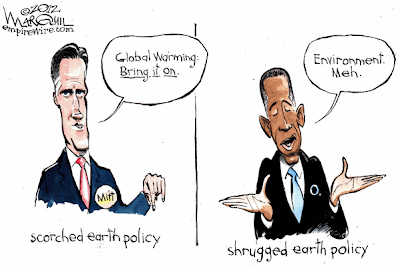
The central themes of the debate were employment generation, handling taxes, reducing the federal budget, the health care system and the role of the federal government in supporting private entrepreneurship — all of this with the aim of reactivating the economy. In no case was the connection made between the environment and economic development.
The reason is that today, for the ordinary American, the short-term economic issue is what is relevant; long-term economic sustainability and environment count for little. If we look at what Obama has done, we conclude that his environmental policy has been poor both nationally and internationally. On the national level, there are some positive measures, but weak and of narrow scope. Standing out as most important are those related to improvement in the quality of fuel for cars, the discount in taxes for the purchase of hybrid or electric cars, the increase in the generation of solar and wind energy and — perhaps the most relevant in terms of investment of public resources — the subsidy for generation and use of low-impact alternative energy, as well as the direct support for some businesses that provide these products. On the international level, North American participation has been extremely poor. In the case of Río+20, President Obama did not attend, sending with his absence a negative signal of U.S. commitment to the pact made 20 years ago at the Rio de Janeiro Convention. Obama is occupied these days with the local campaign, searching for votes that are not found in Rio.
The position of Republican candidate Mitt Romney is even worse. His only reference to the environment, in the past debate, was to affirm that Obama has spent excessive public resources supporting the generation of alternative sources of energy and that these resources should be redirected for the United States to achieve energy independence. With the Republicans, the environmental issue will be even less relevant; their investments will have as their priority the support of activities that generate results in the short-run, but have negative environmental effects.
American politics stand in contrast to Europe’s. In the European Parliament debates, the environment is central and inevitable. Even Germany — in the midst of the economic crisis — decided to assume economic costs to avoid the risks posed by nuclear power plants to health and the environment.
In contemporary democracies, political proposals are syntheses of what the voters want to hear. In Colombia, environmental issues have gained some space in public discussions, but the elected still do not feel any responsibility toward their constituents in regards to environmental compromises. It is upon us as civil society, and the pressure that we exert, that the importance which politicians give to the environmental question in Colombia depends.

Leave a Reply
You must be logged in to post a comment.